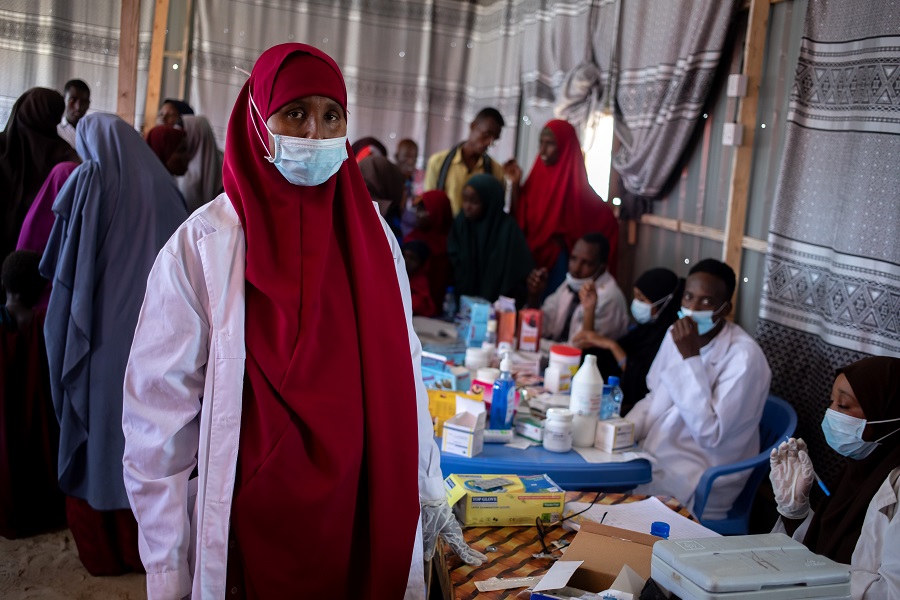
19 June 2023 – Since 2015, every year the International Day for the Elimination of Sexual Violence in Conflict is commemorated on 19 June. The date chosen marks the adoption of the 2008 Security Council resolution condemning sexual violence as a “tactic of war and an impediment to peacebuilding.” Each year, the United Nations and other partners seek to raise awareness of conflict-related sexual violence and the need to end it, to honour the victims and survivors around the world, and to recognize those who have dedicated their lives to its prevention and elimination.
Somalia has long experienced conflict and instability, worsened by climatic shocks, including droughts, floods and cyclones. As a result, the UNOCHA estimates that 3.8 million Somalis have been displaced within the country, 80% of whom are women and children. Many live in camps for internally displaced people (IDPs).
In 2021, the United Nations reported an alarming increase in conflict-related sexual violence in Somalia. This included the use of sexual violence and forced marriage by non-state actors, as well as attacks attributed to government forces and clan militia. Alongside sexual violence as a weapon of war, drought, displacement and instability exacerbate existing inequalities and vulnerabilities and undermine protection mechanisms, heightening risks of sexual and gender-based violence (SGBV). The same conflict, instability and disasters that have caused people to flee their homes also disrupt health and psychosocial support services, which are essential for survivors of SGBV.
WHO Somalia country office works with partners, including the Health Cluster and federal and state ministries of health, to strengthen the health sector’s capacity to prevent and respond to SGBV, particularly in emergencies. This includes supporting the integration of SGBV prevention and response within health programmes, improving case management and referral services for survivors, as well as promoting coordination between partners and providing information and training on preventing and responding to sexual exploitation, abuse, and harassment. WHO as the cluster lead agency is supporting the Health Cluster in Somalia to establish a funding scheme and mentorship programme for the integration of SGBV response activities within health outreach. Throughout 2021, on-the-job capacity development for implementing health and SGBV projects was provided culminating in a now annual workshop where partners meet to share experiences and get opportunities for peer-to-peer support. Overall, over 2100 women and girls have been reached by Health Cluster partners since 2021, with SGBV services, including services for the clinical management of rape.
Further, the Health Cluster worked closely with the gender-based violence area of responsibility to identify supply gaps between Health Cluster partners, when the COVID-19 pandemic caused disruptions in the supply chain, leading to a shortage of post-exposure prophylaxis kits (a crucial component of post-rape care to prevent the survivor from contracting HIV) within the country. WHO, working with the United Nations Population Fund (UNFPA), was crucial in re-establishing supply lines to Health Cluster partners and reducing disruption to services.
Currently, WHO and UNFPA are working together to maintain a cohort of certified clinical management of rape trainers. Cohort members receive regular refresher training and provide training to health care workers across Somalia. During a technical mission from WHO’s Regional Office for the Eastern Mediterranean gender-based violence specialist, conducted in June 2023, the Ministry of Health, UNFPA and WHO undertook a joint mission to Banadir and Madina Hospitals to assess clinical management of rape services. Here, the partners identified areas of health system strengthening to address gender-based violence, including sustainable capacity development and improving health system response like expanding laboratory diagnostic capacities to aid in treatment and care of survivors. The team also met with the Federal Ministry of Health, cluster partners, a donor, and UN agencies working on SGBV. Partners agreed to strengthen coordination, standardize service training content and activate the clinical management of rape technical working group.
“Every woman, man and child everywhere has the right to live free from sexual and gender-based violence,” said WHO Representative to Somalia Dr Mamunur Rahman Malik. “For too long, Somalis, particularly the most vulnerable women and girls, have faced a heightened risk of sexual violence due to conflict and instability. We are proud of what we have been able to accomplish so far with dedicated partners including UNFPA, the Ministry of Health and the Health Cluster – expanding access to services for the clinical management of rape and strengthening referral systems through the integration of SGBV services into routine health care. WHO is committed to ensuring that not only can survivors of sexual violence access the care and support they need, but that this scourge that undermines the human rights of the most vulnerable can be eliminated altogether.”
Although prevalent, SGBV is preventable, even in conflict-situations, and the health sector has a crucial role to play. As well as ensuring that services are available and accessible to survivors of SGBV, WHO will continue to work with the Federal and State governments in Somalia, including the Ministries of Health, Women and Youth, as well as other partners, to reduce the prevalence of SGBV across Somalia.


